Roger Matthews talked about issues relating to ministry and mission.
Download powerpoint: (download)
Download pdf: (download)
Roger Matthews talked about issues relating to ministry and mission.
Download powerpoint: (download)
Download pdf: (download)
(Audio only)
John Spence introduced the theme of Renewal and Reform (website). This emerged from a realisation that the Church of England was no-longer representing the whole of the nation, and that dioceses wanted to focus on growth – but didn’t have a strategy.
A key issue is maintaining the number of clergy, while releasing the talents of lay people. This means that we need a 50% increase in the pace of ordinations.
It was clear that the formula for distributing funds had lost its relevance. It rewarded failure. Fifty Million of funds can now be distributed to poorer parishes and to strategic development funding.
John payed tribute to deaneries, and to the commitment of people working across diverse areas.
The term “growth” is an issue. It must be used in a way that is relevant in diverse areas.
There is a report coming which will say something about the empowerment of all God’s people.
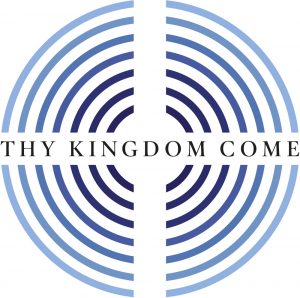
Emma Buchan spoke about the Archbishop’s initiative: Thy Kingdom Come
Download the Powerpoint: (download)
‘Thy Kingdom Come 2017 Invite’ for SOCIAL MEDIA with ENGLISH SUBTITLES from Frogspawn Creative Limited on Vimeo.
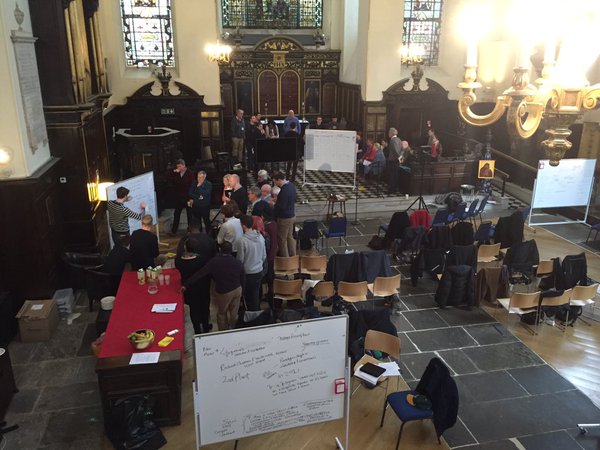
Bishop Ric Thorpe, the Bishop of Islington, kicked the conference off with a passionate and engaging look at church growth.
The video is available via Youtube
The audio quality isn’t high, because we had difficulties with the feed. It’s very quiet for the opening prayer but gets a lot better.
Powerpoint slides: (download) Deanery Mapping Exercises (pdf): (download)
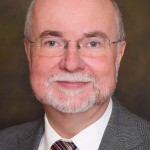
 Dean of Mission and Ministry Diocese of Chelmsford Roger’s ordained ministry has all been based in the Diocese of Chelmsford. Following two parish posts he was appointed Diocesan Mission Officer in 1996, Director for Mission and Ministry in 2001 and became Dean of Mission and Ministry in 2012. He is a member of the Bishop’s Senior Staff team and carries particular responsibility for ministry strategy as well as leading the central mission, training and DDO team. He coordinates the diocese’s world-wide companion links and encourages international learning and partnership. He is a member of the Church of England’s Continuing Ministerial Development Panel. Leadership development has been a major focus of Roger’s work and other ministry interests include spirituality, art, healing and pilgrimage.
Dean of Mission and Ministry Diocese of Chelmsford Roger’s ordained ministry has all been based in the Diocese of Chelmsford. Following two parish posts he was appointed Diocesan Mission Officer in 1996, Director for Mission and Ministry in 2001 and became Dean of Mission and Ministry in 2012. He is a member of the Bishop’s Senior Staff team and carries particular responsibility for ministry strategy as well as leading the central mission, training and DDO team. He coordinates the diocese’s world-wide companion links and encourages international learning and partnership. He is a member of the Church of England’s Continuing Ministerial Development Panel. Leadership development has been a major focus of Roger’s work and other ministry interests include spirituality, art, healing and pilgrimage.
Following two parish posts he was appointed Diocesan Mission Officer in 1996, Director for Mission and Ministry in 2001 and became Dean of Mission and Ministry in 2012. He is a member of the Bishop’s Senior Staff team and carries particular responsibility for ministry strategy. He is a member of the Church of England’s Continuing Ministerial Development Panel. Leadership development has been a major focus of Roger’s work.

Bishop Peter’s love of the countryside translates into a strong interest in rural and environmental issues. This, alongside encouraging children and young people, and supporting the homeless and most vulnerable in society, forms what Bishop Peter describes as the “three threads” of his ministry.
Bishop Peter writes:
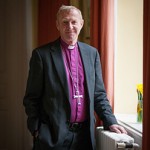 I was born in Kent, but my roots really lie in Hampshire. After a childhood on the Isle of Wight we moved to Fareham when I was 11. School days were happy and I am very grateful for the teachers who shaped and encouraged me through my early years. All three schools which I attended were church foundations and this early Christian influence is something which has shaped my future life.
I was born in Kent, but my roots really lie in Hampshire. After a childhood on the Isle of Wight we moved to Fareham when I was 11. School days were happy and I am very grateful for the teachers who shaped and encouraged me through my early years. All three schools which I attended were church foundations and this early Christian influence is something which has shaped my future life.
I read Natural Sciences at Cambridge and there met Jane. Jane has recently retired as a teacher and we have celebrated 36 years of marriage. We have 4 children – two boys and two girls. They all work in London. Our eldest daughter worked as a tropical agriculturalist in Tanzania and Sierra Leone and now works as a Global Food Security Officer for Tearfund. Tearfund is one of the 13 charities that make up the Disaster Emergencies Committee. Our oldest son is an underwriter. Our other daughter is a physiotherapist at St George’s Hospital. Our youngest son read Mechanical Engineering at Oxford and now works for Atkins who are consultant engineers. We have one grand-daughter, Esme, aged 10 months and a golden retriever dog.After Cambridge I spent a year in Watford working with deprived and sometimes violent young people looking after a dormitory of boys, many of whom were in the care of social services.
I read theology at Oak Hill College, London then served two curacies at Christ Church, Portsdown and in Weymouth, followed by 12 years as Vicar of St Wilfrid, Cowplain. During this time I also became a Rural Dean of Havant and Honorary Canon of Portsmouth Cathedral. I was Archdeacon of the Meon in Portsmouth Diocese for 11 years and then Bishop of Basingstoke in Winchester Diocese for 4 years. I became the 79th Bishop of Bath and Wells in 2014 and we live in a moated palace in Wells, famed for its swans. The diocese was founded in 909 AD, comprises the County of Somerset and has 562 churches.
My hobbies and interests include watching sport both live and on television. I have enjoyed visits to Wimbledon, the Olympics and the Rugby World Cup in recent years. I support Southampton FC and follow Bath Rugby Club. I am occasionally spotted on a golf course, in a swimming pool or skiing. More often I am to be found walking the dog and enjoying the coast and countryside.I am concerned about environmental and Third World Issues. I have worked with young people and students in different ways and enjoy travel and holidays. Last summer Jane and I went to visit our five link dioceses in Zambia and next month we go to Iceland for a few days. This will be fascinating for me as I studied the geology of Iceland whilst at university.
Having lived near to the sea for most of my life I feel a bit ‘landlocked’ in Wells but the delights of the Mendips, Exmoor and the Quantocks provide beautiful places for us to walk. The Levels have largely recovered from the serious flooding which affected Somerset in 2014 but people remain anxious, especially in the current very wet weather which the UK is experiencing.
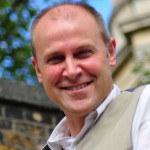
The Bishop of Islington, Rt Revd Ric Thorpe, will be addressing the conference on Friday evening 7th October 2016.
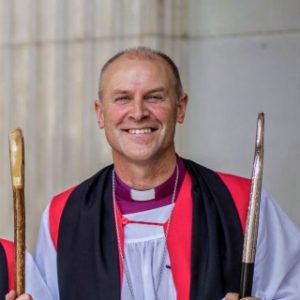
The Rt Revd Ric Thorpe has been Bishop of Islington since September 2015.
Before being appointed to Islington, Bishop Ric was the Bishop of London’s Adviser for Church Planting and Rector of St Paul’s Shadwell.
The role of Bishop of Islington – a revived post that had been vacant since 1923 – is to support London’s Church growth strategy as part of Capital Vision 2020, which sets a target of creating 100 new worshipping communities within the Diocese by 2020. As such, Bishop Ric is free from territorial responsibilities and focuses on supporting newly established worshipping communities both within London and at a national level, serving as a resource for the whole Church of England.
Bishop Ric also contributes to the School of Church Growth in association with the staff of St Mellitus theological college, both in London and at its hub in Liverpool.
At the time of his consecration at St Paul’s Cathedral, Bishop Ric commented:
“It’s a huge privilege to be part of a great team in this diverse city and to focus on starting new churches in a variety of contexts. There are so many opportunities and we want to do all we can to help churches reach new communities with the good news of Jesus Christ.”
Ric was brought up in a Christian home and his faith came alive at Birmingham University while studying Chemical Engineering. He has worked with GEC/Marconi, ICI, and Unilever, and with British evangelist, J.John, before joining Holy Trinity Brompton as worship director. He studied Theology at Wycliffe Hall, Oxford, returning to HTB as curate. In 2005, Ric and his wife, Louie, led a church plant to revitalize St Paul’s Shadwell. St Paul’s has itself planted four further Anglican churches and congregations, all in urban priority areas in Tower Hamlets, East London.
Ric has had a wider role as the Bishop of London’s Advisor for Church Planting and Tutor in Church Planting at St Mellitus College, helping church leaders around London and the UK to prepare and plant new churches. As Bishop of Islington, he is responsible for London Diocese’s goal of creating 100 New Worshipping Communities by 2020 and is available nationally to support Dioceses to plant new churches.
Ric and Louie have three children, Zoe, Barny and Toby, and an English springer spaniel called Tasha. He loves sailing, travel, chocolate, (occasional) exercise and has competed in the London Marathon and London Triathlon.
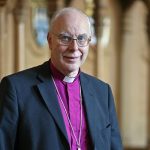
There was a key change to the programme following the Rt Revd Peter Price’s illness when the
Rt Revd John Packer, former Bishop of Ripon and Leeds, stepped in to set the scene for the
rest of the conference.
His opening comment was that it is so important for us to help and support each other in both deaneries and parishes. Every diocese should have a rebel deanery as it asks questions that diocesan leaders do not want to hear.
Echoing the previous evening’s speaker he said that we should push our dioceses into a more positive sharing arrangement with local Methodists and he related how deaneries can be a positive force in synodical government by making proposals that reach general synod level and beyond. The role of the deanery in the community is crucial and it has a right and a duty to reflect on what goes on in its local borough.
He gave a retrospective view as to how the new Diocese of West Yorkshire & The Dales had come about which had implications for forthcoming deanery reorganisations. Deaneries, he said, had become crucial to the life of the CofE and had an increased role in its jigsaw.

Speaker: Penny Stradling
Co-Chair Young Adult Round Table Conferences.
Penny works for the CMS helping people find their vocation in mission. She co-chairs the fresh expressions work with young adults. Currently completing an MA in pioneer ministry Penny co-leads a 20/30s community group in Oxford.
Download the PowerPoint: Download

Pilgrim is a major new teaching and discipleship resource from the Church of England. It aims to help every local church create a place where people can explore the Christian faith together and see how it can be lived out each day.
Pilgrim takes a different approach to other Christian programmes. It approaches the great issues of faith not through persuasion, but participation in a pattern of contemplation and discussion with a group of fellow travellers.
Pilgrim is comprised of two stages: the Follow stage for those very new to faith, and the Grow stage for those who want to go further. Each stage contains four short six-session courses which focus on a major theme of Christian life.
